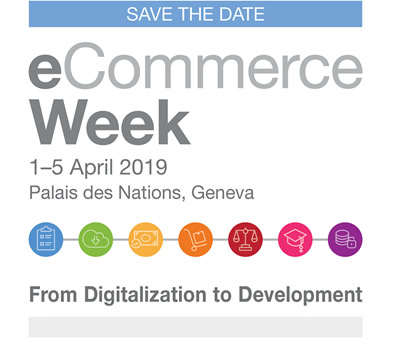Collaborating for success in e-commerce: How jointly managed services can enable small and medium sized enterprises to conduct international e-commerce
3 Apr 2019 15:00h - 16:30h
Event report
[Read more session reports and live updates from the UNCTAD E-commerce Week]
The session, organised by the International Trade Centre (ITC), was moderated by Mr James Howe (Senior Adviser, ITC) and focussed on collaboration and sharing of resources among small and medium enterprises (SMEs) in enhancing the benefits of digital trade. The session focused on the different forms of collaborative business models, as well as on issues related to logistics, fiscal and legal management, payments, and promotion.
Mr Alex Naray (Naray & Associés) stressed collaboration for success in e-commerce using Amazon as an example. The success of Amazon is not based on Amazon itself, but on the reliance on third party sellers, which shows the importance of collaboration. The distinctive feature of Amazon relies on the FBA (Fulfilment by Amazon) process, which is the key to the effective sale of goods. However, in order to benefit from the services, small enterprises can encounter challenges related to the opening of a bank account. To overcome the issue and to connect African manufacturers to the broader global market, the panellist proposed the creation of an EU import structure based on a Swiss agency. The agency would represent African interests and have the mandate to buy African goods and re-sell them on Amazon.
Mr Kwame Acheampong (Head, Africa MarketPlace Africa / Mall for Africa, Nigeria) explained that two primary challenges for African enterprises are related to forms of payments and, most importantly, logistics. The panellist explained how his company connects the African market through its logistic base in the United Kingdom to the broader market. Moreover, their partnership with DHL helped them to create the first marketplace for Africa able to provide a logistic platform for African manufacturers willing to trade outside the continent.
Mr François Martins (Senior Manager of Public Policy, Mercado Libre) talked about the democratisation of e-commerce and access to money as the core mission of Mercado Libre. The services provided depend on the reliance of four groups of vendors (official store, top sellers, other professional sellers, and hobby sellers) and on the business unit supporting the payments, Mercado Pago. Additional factors that, however, need to be considered and improved are related to regulatory issues of connectivity, consumer protection, payment, credits, logistics and transportation.
Mr Gilles Komi Maglo (Chief Executive, MES & DAK Corporation) argued that the greatest challenge faced by Africa is job creation for youth. With this in mind, he stressed the importance of supporting SMEs to address the lack of assistance in accessing market and finance. Additionally, the panellist stressed the need for African-made applications and platforms that would not force Africa to rely on current applications such as WhatsApp, which are the main means of trade in the continent.
Ms Kulthirath Pakawachkrilers (Chief Executive Officer, Co-Founder TEC E-Business Centre Company Limited) introduced the e-commerce landscape in Thailand as a mature and competitive market for e-commerce, e-marketing, e-payment, and e-logistics. With regard to collaboration for success put in place by Thailand, she stressed the role of the shared economy and public-private partnerships in facilitating the establishment of the Thailand Eastern Economic Corridor, the True Digital Park (by the private sector), and the e-Commerce Park by the public sector.
Mr Michael Handlos (Procurement and Communication, DOKMAI RWANDA LTD) concluded the panel discussion by presenting the work of DOKMAI RWANDA LTD, and by highlighting the issues faced by the company in order to tackle challenges related to search engines, social media reach, and fair trade.
By Stefania Grottola
Related topics
Related event

eCommerce Week 2019: From Digitalization to Development
1 Apr 2019 15:45h - 5 Apr 2019 15:45h
Geneva, Switzerland
